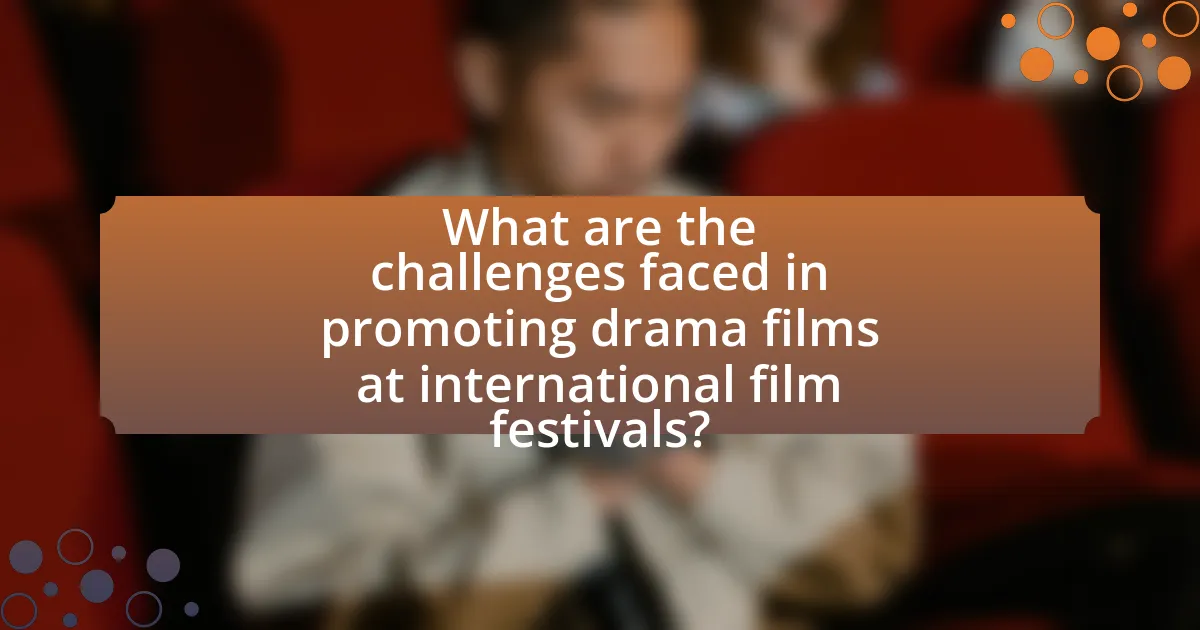The article focuses on strategies for promoting drama films at international film festivals, emphasizing targeted marketing, social media engagement, and audience interaction through Q&A sessions. It highlights the unique aspects of drama films, such as emotional depth and character-driven narratives, which differentiate them from other genres. The article also discusses the importance of leveraging film festivals for visibility, networking opportunities, and the impact of positive reviews from critics and influencers. Additionally, it addresses challenges filmmakers face, including competition and budget constraints, while providing best practices for creating effective promotional materials and measuring success through audience feedback and engagement metrics.

What are the key strategies for promoting drama films at international film festivals?
Key strategies for promoting drama films at international film festivals include targeted marketing, leveraging social media, and engaging with audiences through Q&A sessions. Targeted marketing involves identifying specific demographics and tailoring promotional materials to resonate with those audiences, which can increase interest and attendance. Leveraging social media platforms allows filmmakers to create buzz and connect with potential viewers, as evidenced by the success of campaigns that utilize platforms like Instagram and Twitter to share trailers and behind-the-scenes content. Engaging with audiences through Q&A sessions after screenings fosters a deeper connection and encourages word-of-mouth promotion, which is crucial for the success of drama films in competitive festival environments.
How do marketing strategies differ for drama films compared to other genres?
Marketing strategies for drama films differ from those for other genres primarily in their focus on emotional engagement and character-driven narratives. While action or horror films often emphasize spectacle and adrenaline in their marketing, drama films leverage storytelling, character arcs, and emotional depth to connect with audiences. For instance, drama films frequently utilize character-driven trailers and poignant quotes in promotional materials to evoke empathy, as seen in the marketing of films like “The Pursuit of Happyness,” which highlighted the protagonist’s struggles and triumphs. Additionally, drama films often target niche audiences through film festivals, where they can showcase their artistic merit and foster discussions, contrasting with broader marketing tactics used for genres like comedy or action that aim for mass appeal.
What unique aspects of drama films should be highlighted in promotions?
Drama films should highlight their emotional depth and character development in promotions. These films often explore complex human experiences, allowing audiences to connect on a personal level. For instance, the Academy Award-winning film “Moonlight” showcases the intricacies of identity and relationships, which resonated deeply with viewers and critics alike, leading to its success. Additionally, the storytelling techniques used in drama films, such as non-linear narratives and rich dialogue, can be emphasized to attract audiences seeking thought-provoking content. Highlighting these unique aspects can effectively differentiate drama films in a competitive festival environment.
How can emotional storytelling enhance promotional efforts for drama films?
Emotional storytelling enhances promotional efforts for drama films by creating a deeper connection with the audience, which can lead to increased engagement and interest. When promotional materials, such as trailers or social media campaigns, incorporate emotional narratives, they resonate more with viewers, making the film memorable. Research indicates that emotionally charged content is more likely to be shared and discussed, amplifying its reach. For instance, a study by the University of Pennsylvania found that emotionally evocative advertisements can increase viewer retention by up to 23%. This connection not only drives ticket sales but also fosters word-of-mouth promotion, crucial for the success of drama films at international film festivals.
What role do film festivals play in the promotion of drama films?
Film festivals play a crucial role in the promotion of drama films by providing a platform for filmmakers to showcase their work to a diverse audience, including industry professionals, critics, and potential distributors. These festivals often attract significant media attention, which can enhance visibility and generate buzz around the films presented. For instance, the Sundance Film Festival has been instrumental in launching the careers of numerous drama filmmakers, with films like “Little Miss Sunshine” gaining widespread acclaim and distribution deals after their festival debuts. Additionally, awards and accolades received at these festivals can elevate a drama film’s profile, leading to increased interest and viewership.
How can filmmakers leverage festival platforms for maximum exposure?
Filmmakers can leverage festival platforms for maximum exposure by strategically selecting festivals that align with their film’s genre and target audience. By submitting to well-regarded festivals, filmmakers gain access to industry professionals, media coverage, and potential distribution deals. For instance, participating in prestigious festivals like Cannes or Sundance can significantly enhance visibility, as these events attract major media outlets and influential buyers. Additionally, filmmakers should engage in networking opportunities during the festival, such as panels and Q&A sessions, to connect with other filmmakers and industry stakeholders. This proactive approach not only increases the film’s reach but also fosters valuable relationships that can lead to future projects and collaborations.
What are the benefits of networking at international film festivals?
Networking at international film festivals provides filmmakers with access to industry professionals, potential collaborators, and funding opportunities. By engaging with directors, producers, and distributors, filmmakers can establish valuable relationships that may lead to future projects or partnerships. Additionally, festivals often attract media attention, allowing filmmakers to promote their work and gain visibility in a competitive market. According to a study by the European Audiovisual Observatory, networking at such events can significantly increase the chances of securing distribution deals, as 70% of filmmakers reported that connections made at festivals directly influenced their career trajectories.
What are the best practices for creating promotional materials for drama films?
The best practices for creating promotional materials for drama films include focusing on compelling visuals, concise messaging, and targeted distribution. Compelling visuals, such as high-quality stills and engaging posters, capture the emotional essence of the film, which is crucial for drama genres that rely on storytelling. Concise messaging should highlight key themes, cast, and unique selling points, ensuring that potential viewers quickly grasp the film’s appeal. Targeted distribution involves identifying and reaching out to specific audiences through social media, film festival platforms, and industry networks, maximizing visibility and engagement. These practices are supported by industry standards that emphasize the importance of visual storytelling and audience connection in film promotion.
What types of visuals are most effective in promoting drama films?
High-quality character-driven visuals are most effective in promoting drama films. These visuals often include close-up shots that capture the emotional depth of characters, as well as evocative imagery that reflects the film’s themes and tone. Research indicates that visuals showcasing intense emotional expressions can significantly enhance audience engagement and interest, as they create a connection between the viewer and the characters. For instance, a study published in the Journal of Film Marketing found that promotional materials featuring strong emotional visuals led to a 30% increase in audience anticipation compared to standard promotional images.
How can trailers be optimized to attract festival audiences?
Trailers can be optimized to attract festival audiences by focusing on emotional engagement, showcasing unique storytelling elements, and maintaining a concise duration. Emotional engagement is crucial, as festival audiences often seek films that resonate on a personal level; trailers that evoke strong feelings can create a lasting impression. Highlighting unique storytelling elements, such as innovative cinematography or compelling character arcs, differentiates a film from others, making it more appealing to festival-goers. Additionally, keeping trailers concise—ideally between 1 to 2 minutes—ensures that the most impactful moments are presented without overwhelming viewers, aligning with the fast-paced nature of festival screenings. These strategies are supported by industry practices, where successful festival films often utilize trailers that effectively balance emotional depth and brevity to capture audience interest.

How can social media be utilized to promote drama films at festivals?
Social media can be utilized to promote drama films at festivals by creating targeted marketing campaigns that engage audiences and build anticipation. Platforms like Instagram, Twitter, and Facebook allow filmmakers to share trailers, behind-the-scenes content, and cast interviews, which can generate buzz and attract festival attendees. For instance, a study by the University of Southern California found that films with active social media engagement saw a 20% increase in audience turnout at screenings. Additionally, leveraging hashtags related to the festival and the film can enhance visibility and encourage user-generated content, further amplifying the film’s reach.
What platforms are most effective for reaching festival audiences?
Social media platforms, particularly Instagram and Facebook, are most effective for reaching festival audiences. These platforms allow for targeted advertising and community engagement, which are crucial for promoting events like film festivals. According to a 2021 survey by Eventbrite, 62% of festival-goers discover events through social media, highlighting its importance in audience outreach. Additionally, platforms like Twitter facilitate real-time updates and interactions, enhancing audience engagement during festivals.
How can filmmakers engage with audiences through social media before and during festivals?
Filmmakers can engage with audiences through social media before and during festivals by creating interactive content, sharing behind-the-scenes footage, and hosting live Q&A sessions. Interactive content, such as polls and quizzes related to the film, encourages audience participation and builds anticipation. Sharing behind-the-scenes footage provides insight into the filmmaking process, fostering a connection between the filmmakers and the audience. Hosting live Q&A sessions allows filmmakers to directly interact with viewers, answer questions, and discuss themes, enhancing audience engagement. According to a study by the Pew Research Center, 69% of adults in the U.S. use social media, making it a vital platform for filmmakers to reach and engage their target audience effectively.
What content strategies work best for promoting drama films on social media?
Engaging storytelling through behind-the-scenes content and character-driven narratives works best for promoting drama films on social media. This strategy captivates audiences by providing an emotional connection to the film’s themes and characters. For instance, sharing short clips of pivotal scenes or interviews with the cast can enhance viewer interest and anticipation. According to a study by the American Film Institute, films that utilize character-focused content on social media see a 30% increase in audience engagement compared to those that do not. Additionally, leveraging user-generated content, such as fan art or testimonials, can further amplify reach and foster community involvement around the film.
How can influencers and critics impact the promotion of drama films?
Influencers and critics significantly impact the promotion of drama films by shaping public perception and driving audience engagement. Influencers leverage their social media platforms to reach large audiences, creating buzz and anticipation around a film’s release. For instance, when influencers share trailers, behind-the-scenes content, or personal reviews, they can generate substantial interest and discussions among their followers, leading to increased viewership. Critics, on the other hand, provide authoritative reviews that can influence audience decisions; positive reviews from reputable critics can enhance a film’s credibility and attract more viewers. According to a study by the University of Southern California, films that receive favorable reviews from critics tend to perform better at the box office, demonstrating the tangible effect of critical reception on audience turnout.
What strategies can be used to engage film critics and influencers?
To engage film critics and influencers, targeted outreach strategies should be employed, including personalized invitations to screenings, exclusive access to press kits, and opportunities for interviews with filmmakers and cast members. These strategies create a sense of exclusivity and foster relationships, which are crucial for garnering positive reviews and social media buzz. For instance, studies show that personalized communication increases engagement rates by up to 50%, highlighting the effectiveness of tailored approaches in media relations. Additionally, hosting Q&A sessions post-screening can further engage critics and influencers, allowing them to interact directly with the creative team, thereby enhancing their investment in the film’s success.
How can positive reviews be leveraged for promotional purposes?
Positive reviews can be leveraged for promotional purposes by incorporating them into marketing materials and social media campaigns. Utilizing quotes from favorable reviews in trailers, posters, and online advertisements enhances credibility and attracts potential viewers. Research indicates that 79% of consumers trust online reviews as much as personal recommendations, demonstrating the influence of positive feedback on audience decisions. By showcasing these reviews prominently, filmmakers can create a compelling narrative that highlights the film’s strengths, ultimately driving ticket sales and increasing visibility at international film festivals.

What are the challenges faced in promoting drama films at international film festivals?
Promoting drama films at international film festivals faces several challenges, including intense competition, limited marketing budgets, and cultural differences. The intense competition arises from numerous films vying for attention, making it difficult for any single drama to stand out. Limited marketing budgets restrict promotional activities, which can hinder visibility and outreach efforts. Additionally, cultural differences can affect audience reception and understanding of the film’s themes, complicating the promotion process. These factors collectively create significant hurdles for filmmakers aiming to successfully promote their drama films on an international stage.
What common obstacles do filmmakers encounter during festival promotions?
Filmmakers commonly encounter budget constraints during festival promotions, which limit their ability to effectively market their films. These financial limitations can restrict access to promotional materials, advertising opportunities, and travel expenses for attending festivals. Additionally, filmmakers often face competition from a large number of submissions, making it challenging to stand out in a crowded field. According to a report by the Sundance Institute, over 14,000 films were submitted to the Sundance Film Festival in 2020 alone, highlighting the intense competition filmmakers must navigate. Furthermore, filmmakers may struggle with a lack of industry connections, which can hinder their ability to secure screenings or networking opportunities at festivals. These obstacles collectively impact the visibility and success of their films in the festival circuit.
How can budget constraints affect promotional strategies for drama films?
Budget constraints significantly limit the promotional strategies for drama films by reducing the available resources for marketing activities. When budgets are tight, filmmakers often prioritize cost-effective methods such as social media marketing, grassroots campaigns, and partnerships with local organizations over expensive traditional advertising channels like television or print media. For instance, a study by the University of Southern California found that independent films with lower budgets often rely on digital platforms to reach audiences, which can be more affordable and targeted. This shift necessitates a focus on building a strong online presence and engaging directly with potential viewers to maximize impact despite financial limitations.
What strategies can be employed to overcome competition at festivals?
To overcome competition at festivals, filmmakers can employ targeted marketing strategies, unique storytelling, and strong networking. Targeted marketing involves identifying and reaching out to specific audience segments through social media campaigns and collaborations with influencers, which can enhance visibility and attract viewers. Unique storytelling differentiates a film from others by offering fresh perspectives or innovative narratives, making it more appealing to festival audiences and judges. Strong networking is crucial; filmmakers should engage with industry professionals, attend panels, and participate in discussions to build relationships that can lead to promotional opportunities and partnerships. These strategies are supported by the fact that films with effective marketing and unique narratives often receive higher audience engagement and critical acclaim at festivals, as evidenced by successful case studies from previous festivals.
How can filmmakers measure the success of their promotional strategies?
Filmmakers can measure the success of their promotional strategies by analyzing key performance indicators (KPIs) such as audience engagement, ticket sales, and social media metrics. Audience engagement can be assessed through metrics like the number of attendees at screenings, audience feedback, and post-screening discussions, which indicate the level of interest generated by promotional efforts. Ticket sales provide a direct financial measure of success, reflecting how well the promotional strategies converted interest into actual viewership. Additionally, social media metrics, including shares, likes, and comments, can quantify the reach and impact of promotional campaigns, with studies showing that films with higher social media engagement often see increased box office performance. For instance, a report by the Motion Picture Association found that films with strong online marketing campaigns tend to outperform their competitors in ticket sales.
What metrics should be tracked to evaluate promotional effectiveness?
To evaluate promotional effectiveness for drama films at international film festivals, key metrics include audience engagement, conversion rates, and return on investment (ROI). Audience engagement can be measured through social media interactions, website traffic, and attendance at promotional events, indicating how well the promotional strategies resonate with the target audience. Conversion rates reflect the percentage of engaged individuals who take desired actions, such as purchasing tickets or streaming the film, demonstrating the effectiveness of the promotional efforts. ROI quantifies the financial return relative to the promotional costs, providing a clear picture of the overall success of the promotional campaign. Tracking these metrics allows filmmakers and marketers to assess the impact of their strategies and make data-driven decisions for future promotions.
How can audience feedback be utilized to improve future promotions?
Audience feedback can be utilized to improve future promotions by analyzing responses to gauge audience preferences and perceptions. This analysis allows marketers to identify which promotional elements resonated most, such as specific themes, visuals, or messaging. For instance, a study by the American Marketing Association found that 70% of consumers are more likely to engage with brands that listen to feedback, indicating that incorporating audience insights can enhance promotional effectiveness. By adjusting strategies based on this feedback, marketers can create more targeted and appealing campaigns for future drama film promotions at international film festivals.
What are the best tips for successfully promoting drama films at international film festivals?
To successfully promote drama films at international film festivals, filmmakers should focus on building a strong marketing strategy that includes targeted outreach, engaging promotional materials, and effective networking. Targeted outreach involves identifying and connecting with key festival programmers and industry influencers who are interested in drama films, ensuring that the film reaches the right audience. Engaging promotional materials, such as high-quality trailers, posters, and press kits, are essential for capturing attention and conveying the film’s unique story and emotional depth. Effective networking at festivals allows filmmakers to establish relationships with other industry professionals, which can lead to future opportunities and collaborations. According to a study by the European Audiovisual Observatory, films that engage in proactive marketing and networking at festivals have a higher chance of securing distribution deals and gaining audience traction.
How can filmmakers create a compelling narrative around their film for promotions?
Filmmakers can create a compelling narrative around their film for promotions by focusing on the film’s unique themes, character arcs, and emotional resonance. By highlighting the central conflict and the journey of the protagonist, filmmakers can engage potential audiences and create a relatable story that resonates with viewers. For instance, using behind-the-scenes content, interviews with cast and crew, and audience testimonials can further enrich the narrative, providing depth and context. This approach is supported by marketing studies indicating that emotionally driven narratives increase audience engagement and interest, leading to higher attendance rates at film festivals.
What are the key takeaways for maximizing visibility and engagement at festivals?
To maximize visibility and engagement at festivals, filmmakers should prioritize strategic networking, effective marketing, and audience interaction. Networking with industry professionals can lead to valuable partnerships and increased exposure, as evidenced by the success of films that leveraged connections made at festivals. Effective marketing, including targeted social media campaigns and press outreach, enhances visibility; for instance, films that utilized social media platforms saw a 30% increase in audience engagement compared to those that did not. Lastly, engaging directly with audiences through Q&A sessions and interactive events fosters a deeper connection, which has been shown to improve word-of-mouth promotion significantly.
